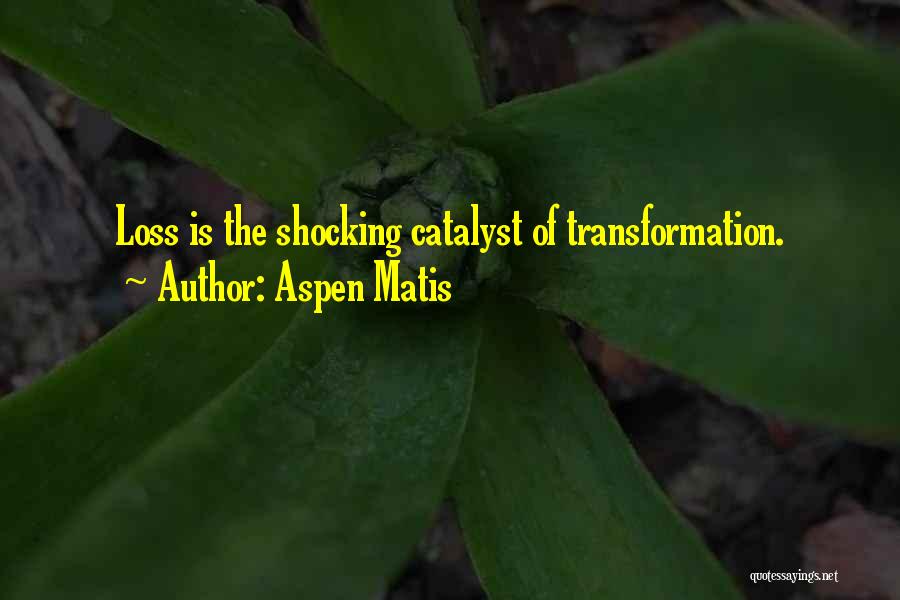Quotes & Sayings About Hiking In The Woods
Enjoy reading and share 21 famous quotes about Hiking In The Woods with everyone.
Top Hiking In The Woods Quotes
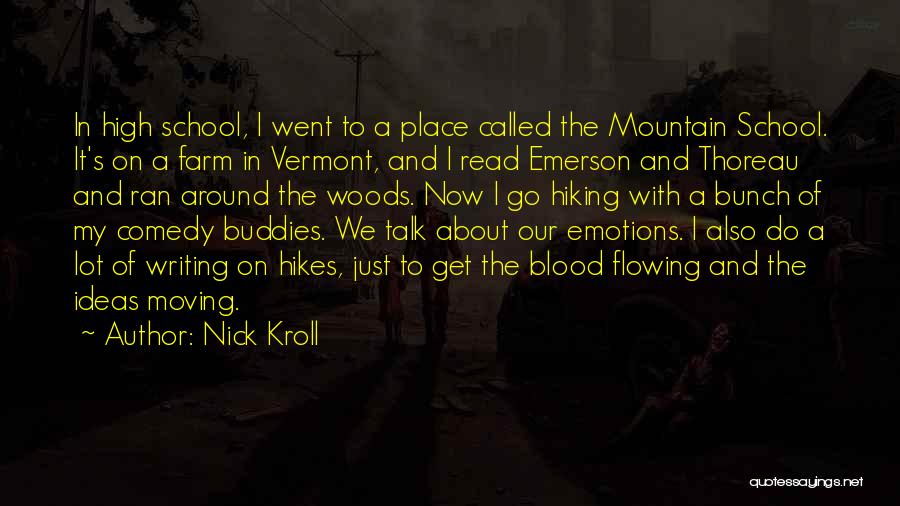
In high school, I went to a place called the Mountain School. It's on a farm in Vermont, and I read Emerson and Thoreau and ran around the woods. Now I go hiking with a bunch of my comedy buddies. We talk about our emotions. I also do a lot of writing on hikes, just to get the blood flowing and the ideas moving. — Nick Kroll
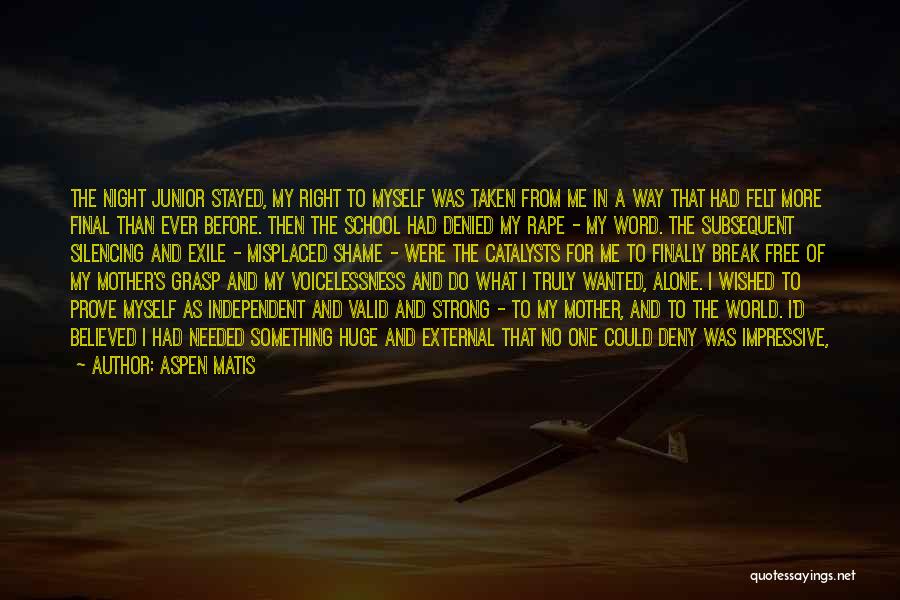
The night Junior stayed, my right to myself was taken from me in a way that had felt more final than ever before. Then the school had denied my rape - my word. The subsequent silencing and exile - misplaced shame - were the catalysts for me to finally break free of my mother's grasp and my voicelessness and do what I truly wanted, alone. I wished to prove myself as independent and valid and strong - to my mother, and to the world. I'd believed I had needed something huge and external that no one could deny was impressive, so I could show my family I was able - so they could finally know that I was strong.
Instead I had shown myself.
And it felt wonderful. — Aspen Matis
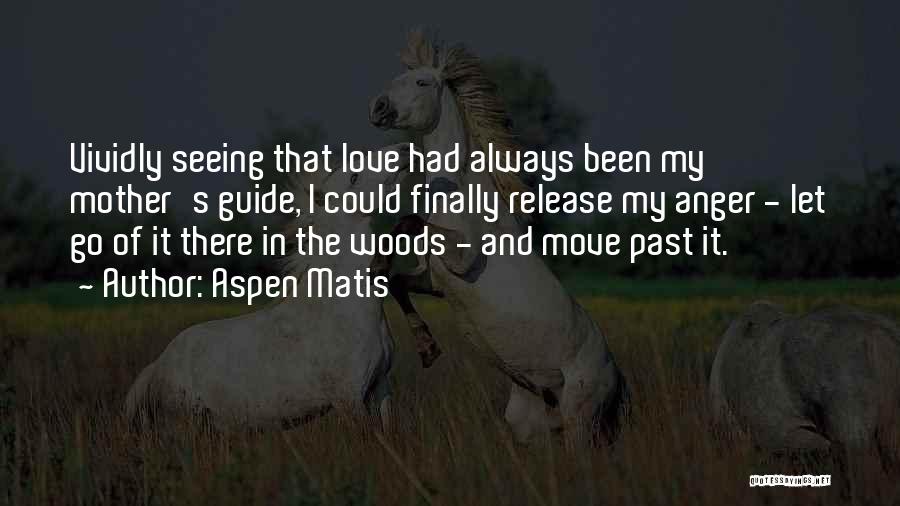
Vividly seeing that love had always been my mother's guide, I could finally release my anger - let go of it there in the woods - and move past it. — Aspen Matis
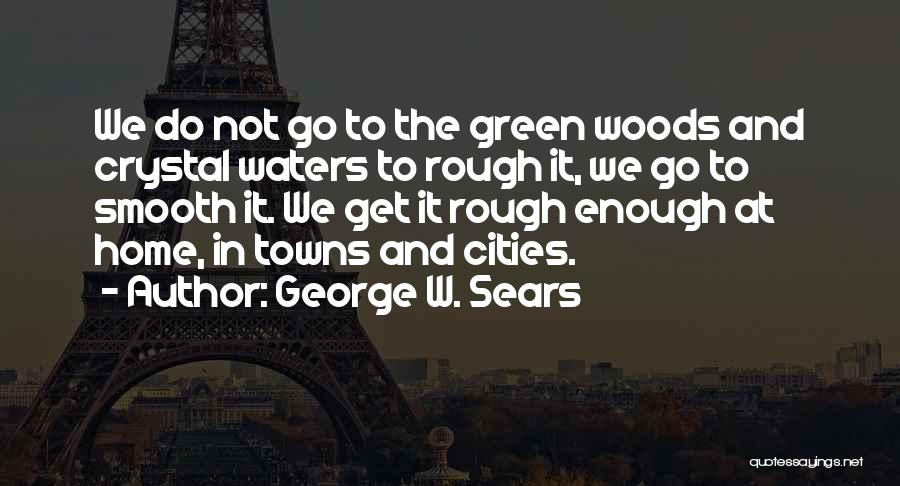
We do not go to the green woods and crystal waters to rough it, we go to smooth it. We get it rough enough at home, in towns and cities. — George W. Sears
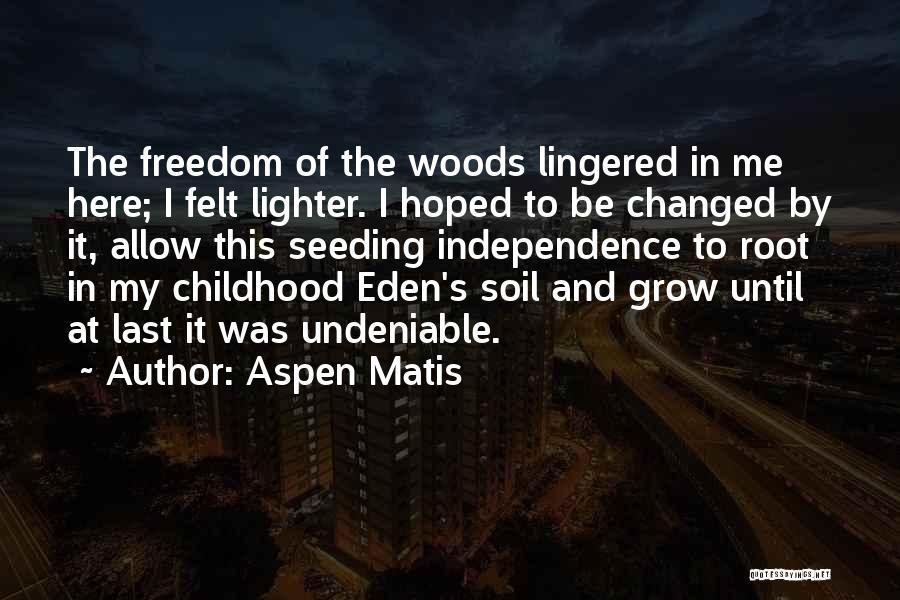
The freedom of the woods lingered in me here; I felt lighter. I hoped to be changed by it, allow this seeding independence to root in my childhood Eden's soil and grow until at last it was undeniable. — Aspen Matis
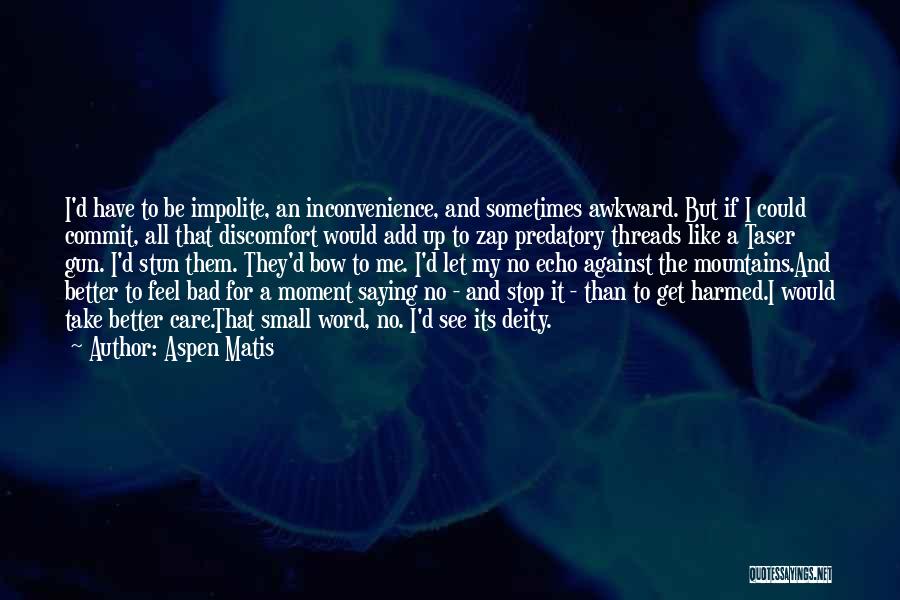
I'd have to be impolite, an inconvenience, and sometimes awkward. But if I could commit, all that discomfort would add up to zap predatory threads like a Taser gun. I'd stun them. They'd bow to me. I'd let my no echo against the mountains.
And better to feel bad for a moment saying no - and stop it - than to get harmed.
I would take better care.
That small word, no. I'd see its deity. — Aspen Matis
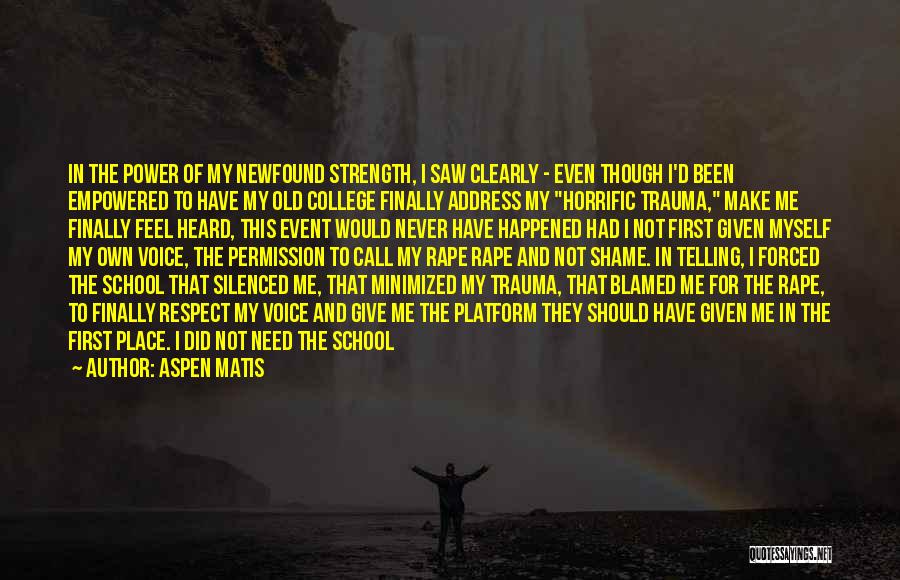
In the power of my newfound strength, I saw clearly - even though I'd been empowered to have my old college finally address my "horrific trauma," make me finally feel heard, this event would never have happened had I not first given myself my own voice, the permission to call my rape rape and not shame. In telling, I forced the school that silenced me, that minimized my trauma, that blamed me for the rape, to finally respect my voice and give me the platform they should have given me in the first place. I did not need the school to call it by its name; I did it myself, and they listened. I was the powerful party that brought the closure and empowerment I'd hoped, in first finding their invitation, that Colorado College would bring. — Aspen Matis
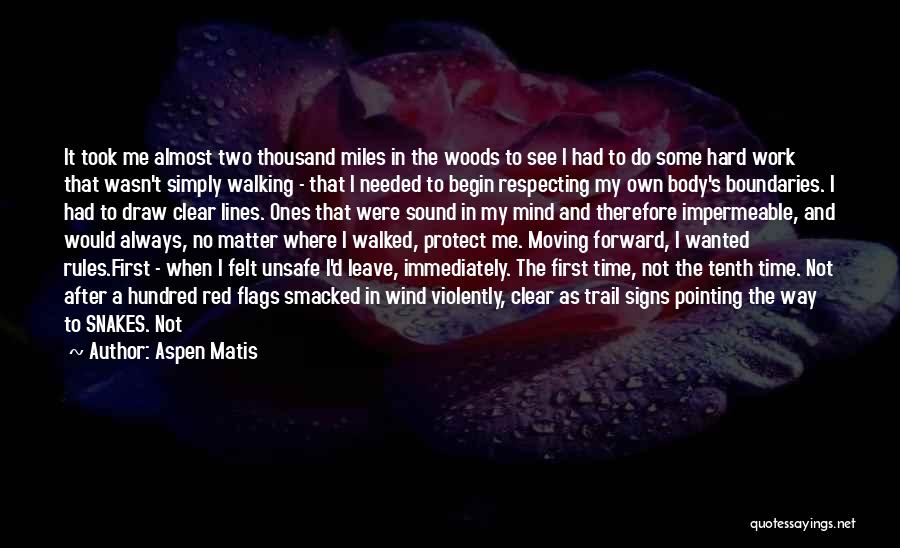
It took me almost two thousand miles in the woods to see I had to do some hard work that wasn't simply walking - that I needed to begin respecting my own body's boundaries. I had to draw clear lines. Ones that were sound in my mind and therefore impermeable, and would always, no matter where I walked, protect me.
Moving forward, I wanted rules.
First - when I felt unsafe I'd leave, immediately. The first time, not the tenth time. Not after a hundred red flags smacked in wind violently, clear as trail signs pointing the way to SNAKES. Not after I'd been bitten - the violation. If I wasn't interested, I would reject the man blatantly. — Aspen Matis
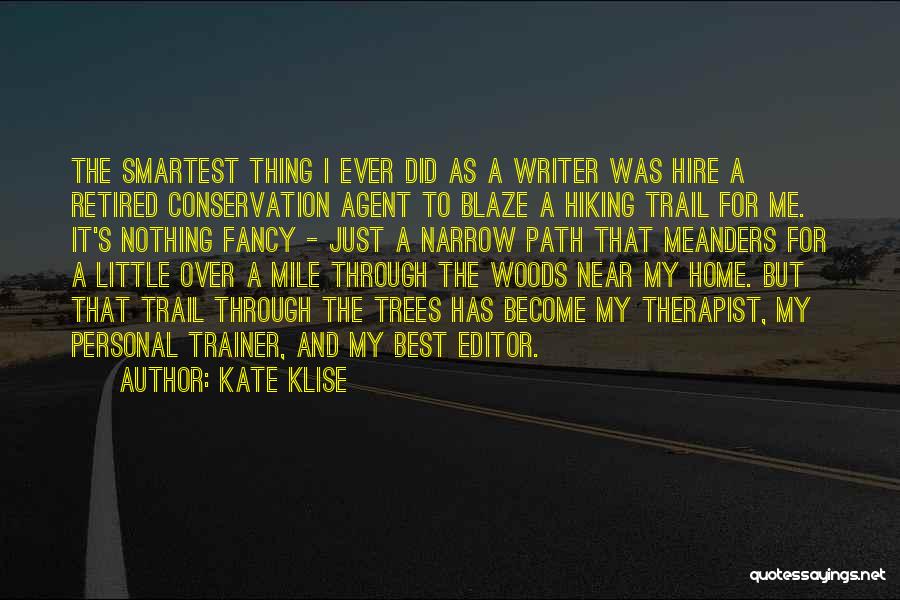
The smartest thing I ever did as a writer was hire a retired conservation agent to blaze a hiking trail for me. It's nothing fancy - just a narrow path that meanders for a little over a mile through the woods near my home. But that trail through the trees has become my therapist, my personal trainer, and my best editor. — Kate Klise
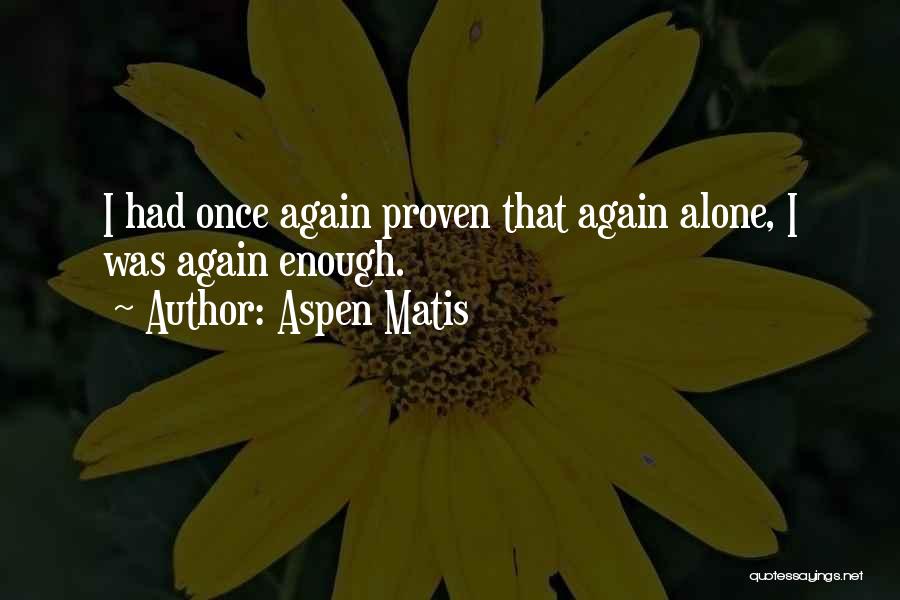
I had once again proven that again alone, I was again enough. — Aspen Matis
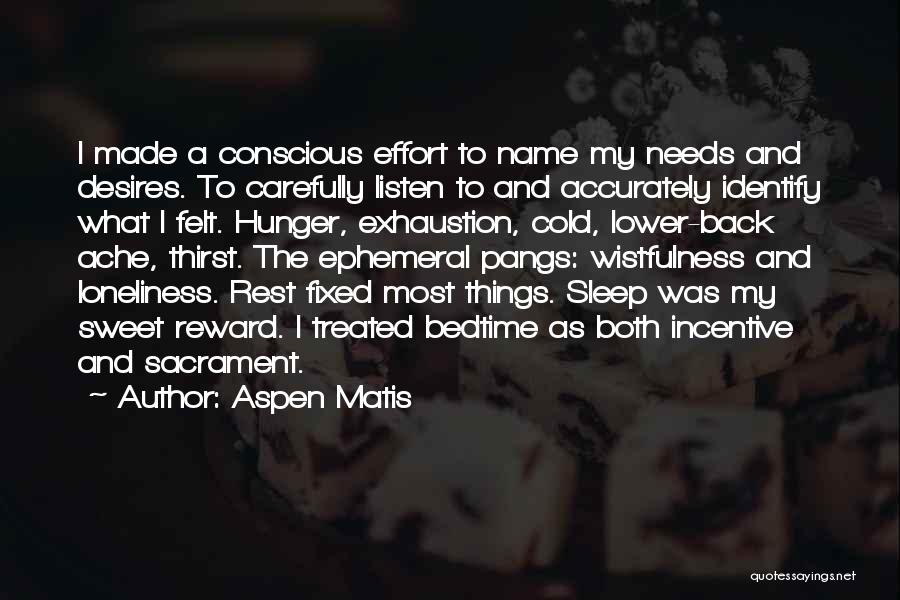
I made a conscious effort to name my needs and desires. To carefully listen to and accurately identify what I felt. Hunger, exhaustion, cold, lower-back ache, thirst. The ephemeral pangs: wistfulness and loneliness. Rest fixed most things. Sleep was my sweet reward. I treated bedtime as both incentive and sacrament. — Aspen Matis
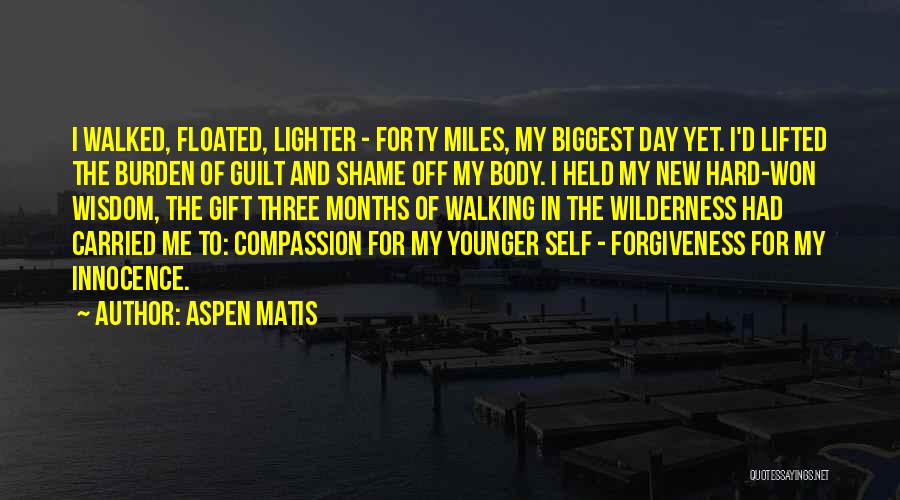
I walked, floated, lighter - forty miles, my biggest day yet. I'd lifted the burden of guilt and shame off my body. I held my new hard-won wisdom, the gift three months of walking in the wilderness had carried me to: compassion for my younger self - forgiveness for my innocence. — Aspen Matis
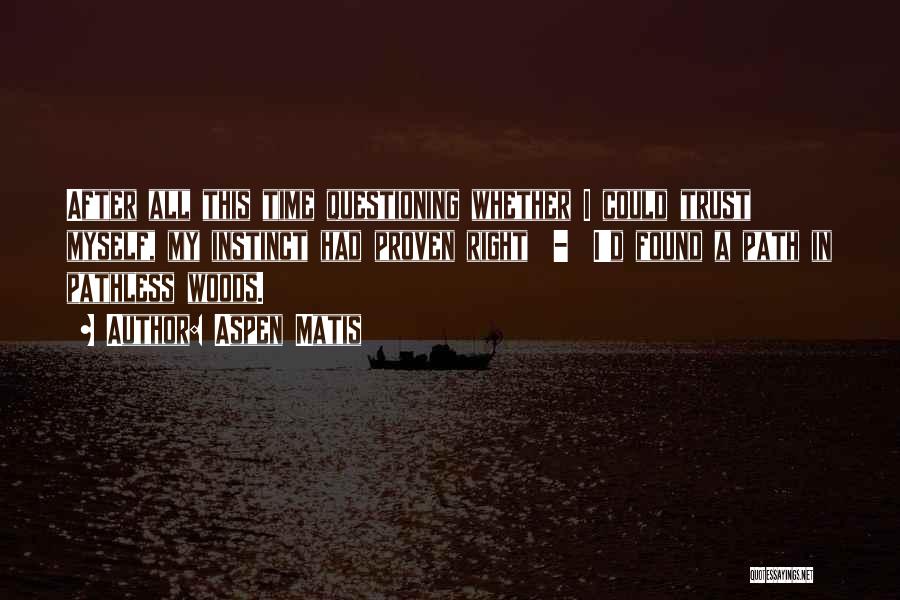
After all this time questioning whether I could trust myself, my instinct had proven right - I'd found a path in pathless woods. — Aspen Matis
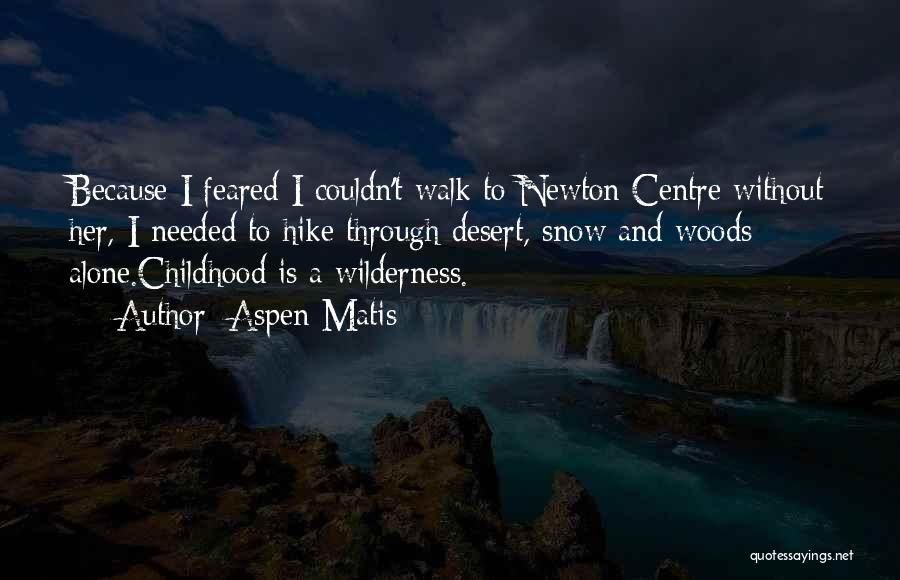
Because I feared I couldn't walk to Newton Centre without her, I needed to hike through desert, snow and woods alone.
Childhood is a wilderness. — Aspen Matis
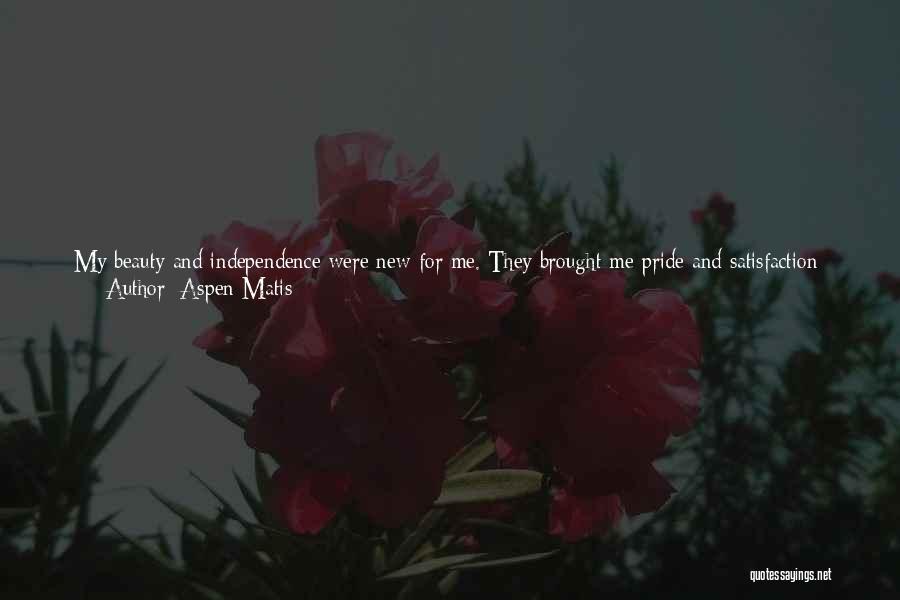
My beauty and independence were new for me. They brought me pride and satisfaction; they changed my sense of possibility. I felt awake in my body. Living in the woods, building my little shelter each night, a silent shadow, drifting in and out of mountain towns, a ghost, I was entirely self-reliant. On the trail I had persisted despite fear, and walking the Pacific Crest had led me deeply into happiness. I felt amazing now. In this body that brought me twelve hundred miles, I felt I could do anything. — Aspen Matis
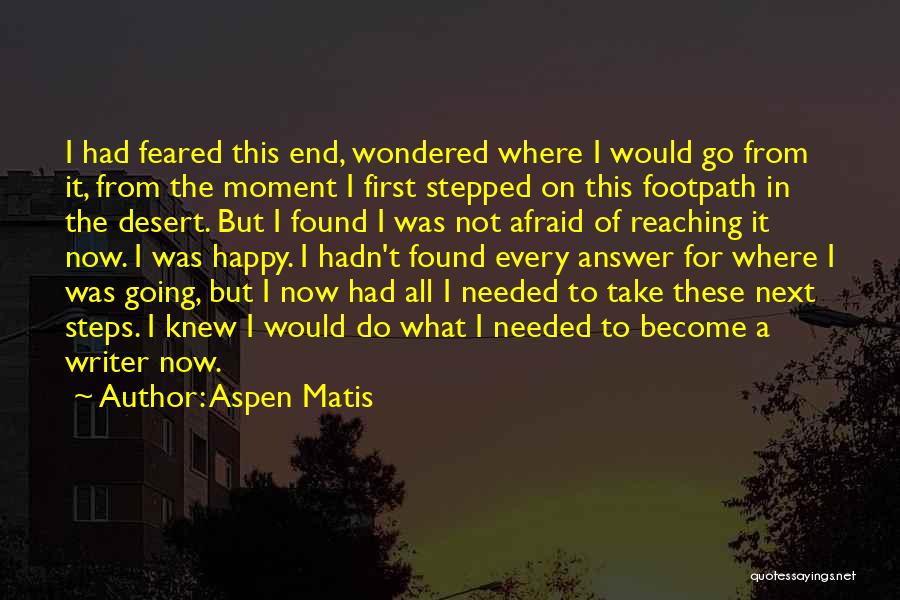
I had feared this end, wondered where I would go from it, from the moment I first stepped on this footpath in the desert. But I found I was not afraid of reaching it now. I was happy. I hadn't found every answer for where I was going, but I now had all I needed to take these next steps. I knew I would do what I needed to become a writer now. — Aspen Matis
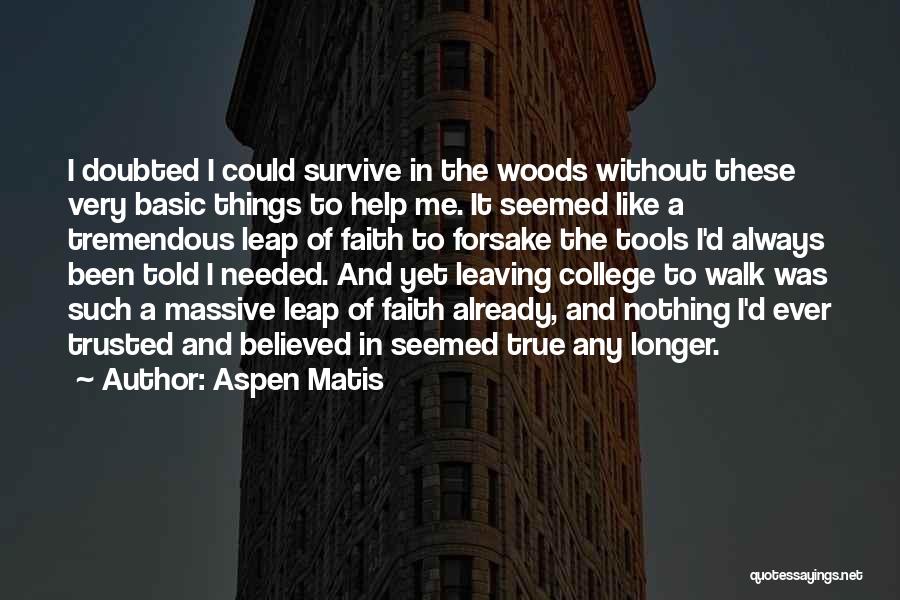
I doubted I could survive in the woods without these very basic things to help me. It seemed like a tremendous leap of faith to forsake the tools I'd always been told I needed. And yet leaving college to walk was such a massive leap of faith already, and nothing I'd ever trusted and believed in seemed true any longer. — Aspen Matis
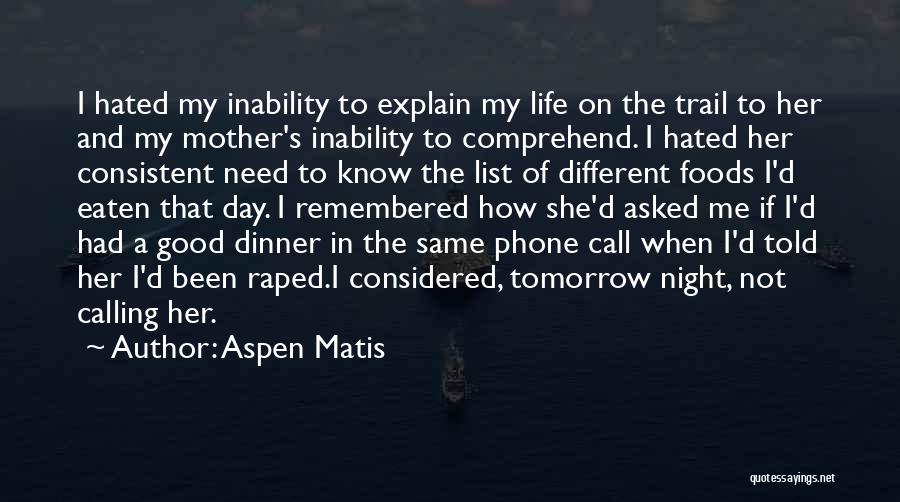
I hated my inability to explain my life on the trail to her and my mother's inability to comprehend. I hated her consistent need to know the list of different foods I'd eaten that day. I remembered how she'd asked me if I'd had a good dinner in the same phone call when I'd told her I'd been raped.
I considered, tomorrow night, not calling her. — Aspen Matis
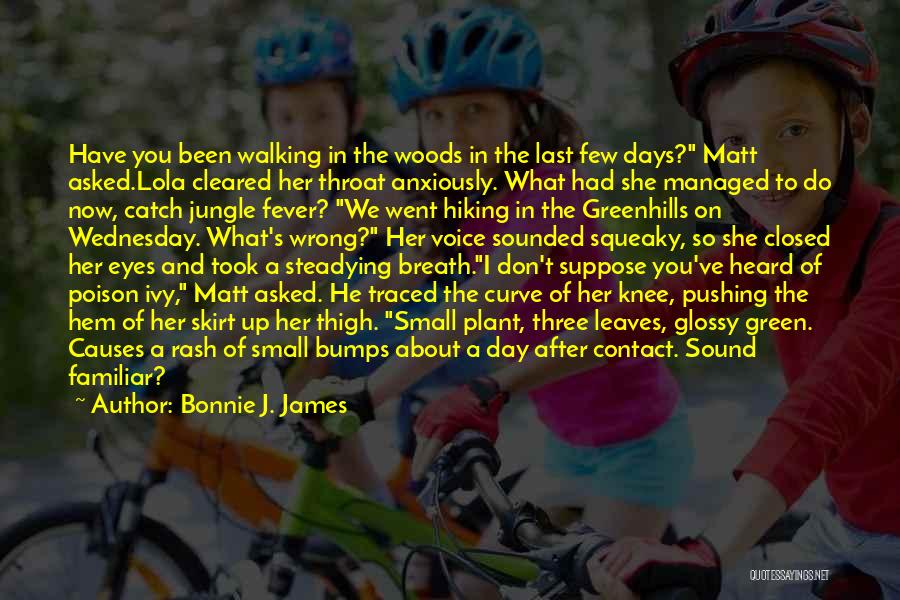
Have you been walking in the woods in the last few days?" Matt asked.
Lola cleared her throat anxiously. What had she managed to do now, catch jungle fever? "We went hiking in the Greenhills on Wednesday. What's wrong?" Her voice sounded squeaky, so she closed her eyes and took a steadying breath.
"I don't suppose you've heard of poison ivy," Matt asked. He traced the curve of her knee, pushing the hem of her skirt up her thigh. "Small plant, three leaves, glossy green. Causes a rash of small bumps about a day after contact. Sound familiar? — Bonnie J. James
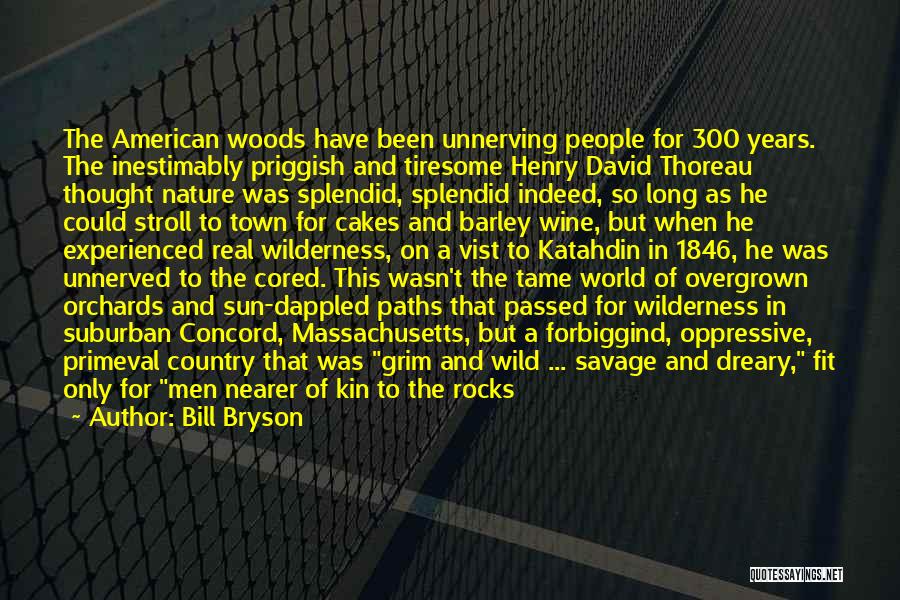
The American woods have been unnerving people for 300 years. The inestimably priggish and tiresome Henry David Thoreau thought nature was splendid, splendid indeed, so long as he could stroll to town for cakes and barley wine, but when he experienced real wilderness, on a vist to Katahdin in 1846, he was unnerved to the cored. This wasn't the tame world of overgrown orchards and sun-dappled paths that passed for wilderness in suburban Concord, Massachusetts, but a forbiggind, oppressive, primeval country that was "grim and wild ... savage and dreary," fit only for "men nearer of kin to the rocks and wild animals than we." The experience left him, in the words of one biographer, "near hysterical. — Bill Bryson






